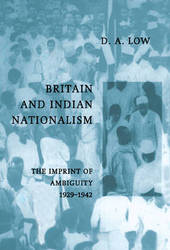
|
Britain and Indian Nationalism: The Imprint of Amibiguity 1929-1942
Hardback
Main Details
| Title |
Britain and Indian Nationalism: The Imprint of Amibiguity 1929-1942
|
| Authors and Contributors |
By (author) D. A. Low
|
| Physical Properties |
| Format:Hardback | | Pages:378 | | Dimensions(mm): Height 229,Width 152 |
|
| Category/Genre | Asian and Middle Eastern history
World history - from c 1900 to now |
|---|
| ISBN/Barcode |
9780521550178
|
| Classifications | Dewey:954.0358 |
|---|
| Audience | | Professional & Vocational | |
|---|
| Illustrations |
5 Maps
|
|
Publishing Details |
| Publisher |
Cambridge University Press
|
| Imprint |
Cambridge University Press
|
| Publication Date |
18 September 1997 |
| Publication Country |
United Kingdom
|
Description
India's struggle for independence was arguably the most momentous of the twentieth century, and central to it was the generation of powerful nationalist forces. In a series of detailed studies Anthony Low shows how the ambiguity of the British position conditioned the distinctive character of this struggle: how the British determination to hold fast their Indian empire (unlike the Americans in the Philippines) prior to 1942 was nonetheless complemented by a reluctance to resist their nationalist opponents in the unyielding ways of the French in Vietnam and the Dutch in Indochina. Much that Gandhi did, Professor Low concludes, would have been unnecessary in the Philippines and impossible in Indonesia and Vietnam, but astutely fitted the peculiar conditions of the nationalist struggle against the British in India. Published on the fiftieth anniversary of Indian independence, Britain and Indian Nationalism makes a major contribution to the historiography of modern India, to Britain's relations with its empire, and to the history of decolonisation in the twentieth century.
Reviews' ... this book constitutes a very considerable achievement by a mature and painstaking scholar.' South Asia 'I can only hope that in time it will be on the shelves of all those with a serious interest in Western colonial experience ...' The Journal of Asian Studies
|